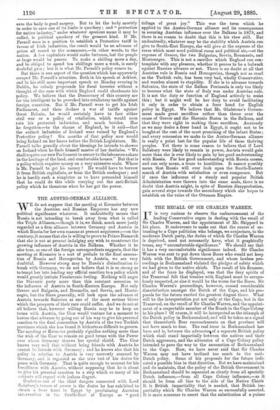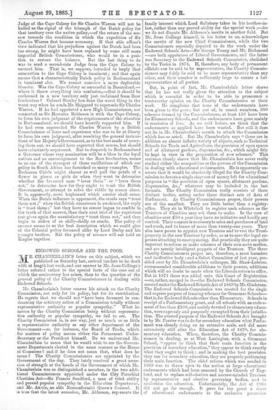THE RECALL OF SIR CHARLES WARREN.
IT is very curious to observe the embarrassment of the leading Conservative organ in dealing with the recall of Sir Charles Warren, and the appointment of Mr. Shippard in his place. It endeavours to make out that the course of en- trusting to a Cape politician who belongs, we conjecture, to the moderate Dutch party, the duties of which Sir Charles Warren is deprived, need not necessarily have, what it graphically terms, any " uncomfortable significance." We should say that it has a very uncomfortable significance indeed. Sir Charles Warren was sent to put down those Boers who would not keep faith with the British Government, and whose lawless pro- ceedings in Bechuanaland violated the pledges of safety which we had given to the native chiefs. The result of his firmness, and of the force he displayed, was that the fiery spirits of the Transvaal felt that treaties with England must be scrupu- lously respected, or else it would be the worse for the Boers. Sir Charles Warren's proceedings, however, caused considerable dissatisfaction amongst the Dutch of the Cape, and his pro- posals for the future excited the greatest disgust there. What will be the interpretation put not only at the Caps, but in the Transvaal, on the recall of Sir Charles Warren, and the appoint- ment of a respectable member of the Bench in the Cape Colony in his place ? Of course, it will be interpreted as the triumph of the Dutch policy in Bechuanaland, and will be taken as a signal that thenceforth Boer encroachments on that province will not have much to fear. The real issue in Bechuanaland has been and is, between the advocate% of a separate British policy which shall stand impartially between the natives and their Dutch aggressors, and the advocates of a Cape Colony policy intended to pave the way to the annexation of Bechuanaland to the Cape. Now, we have never said that Sir Charles Warren may not have inclined too much to the anti- Dutch policy. Some of his proposals for the future indi- cated a possible bias in that direction. But we have maintained and do maintain, that the policy of the British Government in Bechuanaland should be separated as clearly from all specially Dutch influence,—from all Cape Colony influence,—as it should be from all bias to the side of the Native Chiefs It is British impartiality that is needed, that British im- partiality which Sir Charles Warren so successfully asserted. It is mere nonsense to assert that the substitution of a puisne
Judge of the Cape Colony for Sir Charles Warren will not be hailed as the signal of the triumph of the Dutch policy for that territory over the native policy,—of the return of the see- saw towards the condition in which the expedition of Sir Charles Warren first became necessary. If that able officer's view indicated that his prejudices against the Dutch had been too strong, he might have been replaced by some still more impartial British Commissioner, who would be in a posi-
tion to restore the balance. But the last thing to do was to send a second-rate Judge from the Cape Colony to succeed him. That is, we suppose, intended to imply that annexation to the Cape Colony is imminent ; and that again means that a characteristically Dutch policy in Bechuanaland is imminent also. We cannot conceive a more deplorable blunder. Was the Cape Colony so successful in Basutoland,— where it threw everything into confusion,—that it should be enthroned in a new territory only just reclaimed from Boer freebooters ? Colonel Stanley has done the worst thing in the worst way when he sends Mr. Shippard to supersede Sir Charles Warren. If he had appointed a new High Commissioner, not connected as Sir Hercules Robinson is with the Cape Colony, to form his own judgment of the requirements of the situation in Bechuanaland, we should have heartily supported him. If he had even superseded Sir Charles Warren by a British Commissioner of force and experience who was to be at liberty to form his own judgment, after receiving the general instruc- tions of her Majesty's Government, as to the best mode of carry- ing them out, we should have regretted that course, but should have reluctantly acquiesced. But to despatch to Bechuanaland a Governor whose very nomination will be a blow to the loyal natives and an encouragement to the Boer freebooters, seems to us one of the strangest of those vacillations of which our policy in South Africa has furnished so many examples. The Bechuana Chiefs might almost as well pull the petals of a flower to pieces as girls do when they want to determine whether the favoured man "loves them" or "loves them not," to determine how far they ought to trust the British Government, as attempt to solve the riddle by reason alone. It is, apparently, mere haphazard which answer shall come. When the Dutch influence is uppermost, the oracle says "trust them not ;" when the British conscience is awakened, the reply is " trust them ;" but they have no sooner begun to confide in the truth of that answer, than their next trial of the capricious test gives again the unsatisfactory "trust them not," and they begin to sicken of so shilly-shally an oracle. The policy of see-saw seems to us the best description which we could give of the Colonial policy favoured alike by Lord Derby and his younger brother. But the policy of see-saw will not hold an Empire together.



































 Previous page
Previous page